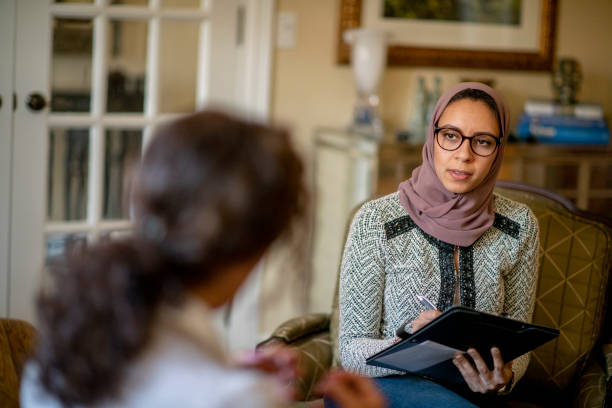The distinction between ‘insiders’ and ‘outsiders’ has been a subject of longstanding debate within Religious Studies and especially within multidisciplinary/interdisciplinary studies of Islam and Muslims. This issue poses questions such as -can outsiders truly understand and interpret the faith of the Other? Is it possible for insiders to maintain objectivity when studying and representing the tradition they identity with? This distinction has implications for how researchers relate to the people they engage with and how they decide to interpret and represent the subject matter of the research.
In this short reflection, I outline some of the theoretical and methodological challenges of conducting fieldwork I’ve encountered among British Muslim communities as a researcher, who is both an insider and outsider and how this informs my approach to being a Research Fellow for the Digital Islam in Britain project.
The study of faith communities by people from within them is regarded by some as problematic as it is often assumed that a person that follows a religion is subjective in their perspective, whilst an outsider is objective. This is a misleading proposition. As Sara J Abramson points out “The bipolar construction of insider/outsider also sets up a false separation that neglects the interactive processes through which ‘insiderness’ and ‘outsiderness’ are constructed…as ethnographers we are never fully outside or inside the ‘community.”[1]
Scholar of Islam in Britain Ron Geaves has argued that researcher reflexivity -is a required prerequisite, i.e., being conscious of how feelings and motives can influence the conducting of fieldwork, in other words, the researcher should be prepared to frequently ask ‘why do I think I know what I think I know?‘ Acknowledging the possibility for this unconscious bias is one way to manage the challenging experience of conducting research on a topic or in an environment where one has a personal stake. In this way both insiders and outsiders can acknowledge the impact of their identity and biography upon their research.[ii]
In my research experiences within Muslim communities, I have held a dual positionality that has allowed me to gain access but it has also led to barriers and dead ends. Having conducted fieldwork within Muslim communities gives me the advantages of having an insider status that comes from being part of the faith group with an awareness of the languages, culture, religion and internal experiential insights that someone outside the faith does not often possess. Being a visible Muslim has helped help me to develop trust and avoid certain barriers, assumptions and blind alleys. In some contexts, I can draw upon my own autobiographical experiences and I have found that it also helps to have a published body of work.
However, possessing a shared religious background does not always enable access to British Muslim communities or secure research participation. Given socio-political developments over the last 20 years since the beginning of the so-called ‘War on Terror’ in 2001, and the London Bombings of 2005, many British Muslim communities were inundated with media reporters and academic researchers wanting to speak with them. The Prevent counter-terrorism programme had a largely negative and counter-productive effect within British Muslim communities and eroded trust between the state and external agencies – resulting in them feeling like a ‘suspect community’.[iii]
The term ‘research’ has also become politically charged and often translates as into ‘investigation.’ In these cases, members of those communities can be hostile or unwilling to co-operate based upon previous experiences with non-Muslim and Muslim researchers. Conducting research can raises questions such as: “Why are you doing this?” “Who is this for?” “Is this for the government?” “Are you working with the security services?” At certain times, I am not seen as an insider, because I do reside in that locality and do not have a personal stake in that community, furthermore, being an academic researcher affiliated within a non-Muslim institution has a power dynamic that can shape the research-researched process.
These scenarios make it difficult for researchers to engage communities who are sceptical of outsiders. There is also the potential of academics experiencing resistance due to ‘interviewee fatigue’. Also, a common grievance that communities vocalise is that they receive nothing in return for their co-operation and can hold pessimistic attitudes that “nothing will change” after researchers finish their work and move on. This is not easy to resolve and can therefore take time to reassure individuals of the worthiness of the research project, gain their trust and provide compensation for their participation. Despite taking embedding good practices, sometimes people will still politely decline.
When I am able to enable respondent co-operation, I try to be reflexive and am fully aware of my positionality and recognising the multiple ways in which my layered identity ( Muslim, Male, Bengali, British) may affect fieldwork encounters and outcomes. I acknowledge the perceived overt or hidden power relations that result from interpreting another person’s voice. I also find that research projects that have a degree of co-design with the stakeholders not only makes for a more equitable interaction, but also is likely to produce a more grounded, better-quality scholarship. This factor was taken very seriously by the Digital British Islam research team and our Advisory Board has Muslim community organisational representatives’s input is integrated into our methodologies and research planning process. Taking this approach addresses issues of power, helps overcome the insider-outsider dichotomy and will generate more richer and nuanced findings.
[1] Sarah J. Abramson. Insider-Desire: Coveting Insider Status and Its Consequences in Ylivai Collins-Mayo and Pink Dandelion (eds). Religion and Youth. Ashgate. Aldershot.2010).
[ii] See for example George D. Chryssides and Stephen E. Gregg (eds): The Insider/Outsider Debate: New Perspectives in the Study of Religions. Equinox, 2019.
[iii] Francesco Ragazzi. Suspect community or suspect category? The impact of counter-terrorism as ‘policed multiculturalism’, Journal of Ethnic and Migration Studies, 2016 vol. 42, no. 5, 724–741

